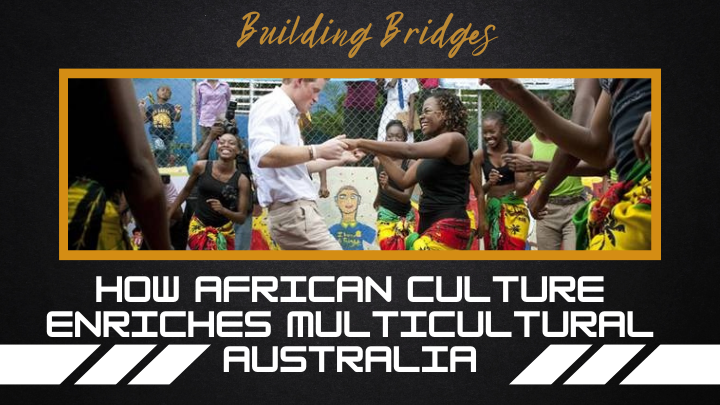Building Bridges
Australia is often celebrated for its rich cultural diversity, a product of generations of migration and the blending of traditions from around the world. African communities, with their deep cultural heritage and history, have contributed significantly to the country’s multicultural fabric. From vibrant festivals and unique cuisine to artistic expressions and thriving businesses, African culture plays a pivotal role in enriching Australian society.
In this article, we explore how African traditions, food, art, and businesses have not only shaped the communities they belong to but also how they have helped build bridges that promote cultural understanding, inclusivity, and unity in Australia.
1. African Traditions and Cultural Celebrations
African traditions, whether in music, dance, or festivals, serve as a source of pride and cultural identity for African Australians, while also offering a unique opportunity for all Australians to engage with the continent's diverse cultures.
- Festivals and Cultural Events: Across Australia, African communities celebrate major cultural festivals that invite everyone to partake in the celebration of African heritage. Africa Day, held every May, is one of the most significant events, commemorating the founding of the Organization of African Unity and the achievements of African nations. The day is marked with music, food, dance, and discussions about Africa's history, development, and future.
Afrika Festival in Melbourne and African Music and Dance Festival in Sydney are just some examples of how these celebrations not only bring African communities together but also allow other Australians to learn more about Africa’s rich traditions. These events showcase the vibrancy of African culture through performances, art exhibitions, and the sharing of stories from different African nations, all while fostering a sense of unity within Australia’s broader multicultural society. - Religious and Spiritual Practices: Many African Australians observe traditional religious holidays and spiritual practices, from Eid celebrations in Muslim communities to the vibrant Christian festivals celebrated by African diaspora groups. These cultural practices create opportunities for interfaith dialogue, fostering deeper understanding and appreciation of the diverse spiritual beliefs held within African communities in Australia.
2. African Cuisine: A Feast for the Senses
Food is one of the most beloved ways African culture is shared with Australia. African cuisine is known for its bold flavors, rich spices, and diverse ingredients, reflecting the continent’s cultural and geographical diversity. African Australians have introduced their culinary traditions to Australian communities, creating a delightful fusion of cultures that has enriched the country's food scene.
- Popular Dishes and Ingredients: Traditional African dishes like Jollof rice, Ugali, Samosas, Bunny Chow, and Injera are enjoyed by African Australians and increasingly by non-Africans as well. African restaurants, cafes, and food trucks serve as gathering places where both Africans and Australians can explore new flavors and dishes. The influence of African cuisine has also seeped into mainstream Australian food culture, with ingredients such as plantains, cassava, and sorghum becoming more commonly available in supermarkets.
- Sharing Cultural Traditions Through Food: For African Australians, food is a way to stay connected to their roots while sharing a piece of their culture with others. African families often gather around the table to enjoy traditional meals during holidays, celebrations, and everyday life. These family meals offer not just nourishment but also a sense of belonging, as food becomes a key aspect of their identity in Australia. Food events, such as cooking classes and food festivals, allow for cross-cultural learning and connection, enhancing Australia’s multicultural experience.
3. African Art: A Rich Tapestry of Expression
African art—ranging from visual arts to music, dance, and performance—is a powerful means of storytelling and cultural expression. Through art, African Australians express their unique identities and experiences, while also contributing to Australia’s broader artistic landscape.
- Visual Art and Craft: African Australian artists have contributed to the country’s art scene with their vibrant work in painting, sculpture, and textiles. Traditional art forms such as beadwork, Ndebele painting, Adinkra symbols, and wood carving can be seen in galleries, cultural centers, and festivals. Contemporary African artists are also gaining recognition in the Australian art world, using their platforms to tell stories of migration, heritage, and identity, offering Australian audiences a glimpse into their experiences.
- Music and Dance: Music is at the heart of African culture, and African Australians are sharing their rhythms, sounds, and stories through their music. From Afrobeat and highlife to reggae and hip-hop, African musicians in Australia are contributing to the country’s diverse music scene. Australian audiences are increasingly enjoying African-influenced music, and African artists are blending their traditional sounds with contemporary Australian styles to create unique musical experiences. African dance, including styles like Azonto and Sabar, also contributes to Australia’s growing dance scene, with dance schools and community groups offering classes that showcase these lively and expressive movements.
- Storytelling Through Art: African art is also a powerful tool for storytelling. Artists create works that depict traditional legends, historical events, and personal narratives. These artworks help preserve African cultural heritage while educating Australians about the African experience. Many African Australian artists have used art as a platform to challenge stereotypes and raise awareness about issues such as migration, racism, and social justice.
4. African Businesses: Contributing to the Economy and Community
African Australians have established a wide range of businesses that not only serve their communities but also contribute significantly to Australia’s economy and multicultural society. These businesses are a testament to the entrepreneurial spirit and resilience of African immigrants and their desire to build prosperous futures for themselves and their families.
- African-owned Businesses: Across Australia, African entrepreneurs have established businesses in various sectors, including food and hospitality, fashion, music, beauty, and trade. These businesses create jobs, foster economic growth, and contribute to the cultural richness of local communities. African-owned fashion brands, such as those that design and sell traditional African garments like Dashikis and Kente cloth, have gained recognition and popularity in mainstream Australian markets.
- Connecting Africa and Australia: Many African entrepreneurs in Australia play a critical role in connecting African and Australian markets. Through trade and cultural exchange, these businesses help promote African products and services in Australia while showcasing Australian goods in African countries. This contributes to economic cooperation and the strengthening of ties between Australia and the African continent.
- Community Empowerment: African businesses also serve as hubs for community support. They provide a space for African Australians to meet, network, and share experiences. In many African communities, these businesses become centers for social and cultural activities, from hosting African language classes and cultural workshops to providing resources for new immigrants. This sense of community empowerment helps foster a sense of belonging and facilitates integration into Australian society.
5. Building Bridges Through Education and Advocacy
African Australians also contribute to the multicultural landscape by engaging in advocacy and education. They play an essential role in promoting cross-cultural understanding and ensuring that the voices of African communities are heard in public discourse. Through community organizations, educational programs, and outreach initiatives, African Australians work to build bridges with other cultural communities, promote diversity, and address issues such as racism, inequality, and social justice.
- Cultural Exchange Programs: African Australians actively participate in cultural exchange programs, where they share their experiences and educate the broader Australian community about the African diaspora. These programs often involve collaborations with schools, universities, and local councils, offering insights into African history, art, and culture.
- Social Justice Advocacy: Many African Australians are at the forefront of advocacy for human rights, racial equality, and social justice. Their work helps address systemic challenges such as discrimination, exclusion, and inequality, while also promoting policies that support multiculturalism and inclusion in Australian society.
African culture’s contributions to Australia are invaluable, from the food we eat to the art we enjoy, and the traditions we celebrate. Through festivals, cuisine, music, and businesses, African Australians have enriched the nation’s multicultural tapestry, making it even more vibrant and diverse. As African communities continue to thrive in Australia, their traditions, creativity, and entrepreneurial spirit help shape a more inclusive society—one where cultural exchange, mutual respect, and unity are celebrated. By building bridges through culture, African Australians have not only created a space to share their heritage but have also fostered greater understanding and appreciation of African history and identity within Australia’s broader multicultural context.



